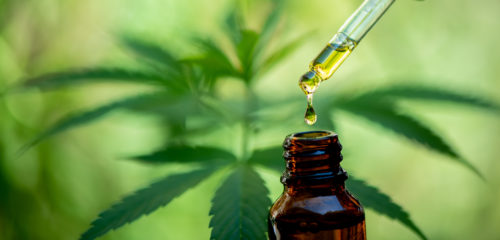CBD, or Cannabidiol, naturally occurs in the hemp plant and contains less than 0.3% THC. CBD extract is non-psychoactive and often comes in the form of an oil mixed with a carrier oil for use in various body care products.
THC, or Tetrahydrocannabinol, comes from the cannabis plant and can contain anywhere from 5% to 35% THC. Unlike CBD, THC is psychoactive and used for a range of medicinal and recreational purposes. Hemp and cannabis plants can both be used to produce CBD and THC; however, hemp has a higher concentration of CBD, while cannabis has a higher concentration of THC.
Process of Making CBD/THC Oil
Manufacturing CBD and THC oil involves various steps, including pre-processing, extraction, refinement, and more.
Pre-Processing Stage: Cannabis/Hemp
Manufacturers use mature female hemp or cannabis plants in their raw states to produce CBD and THC oil. Once the plants are harvested, they’re dried and sorted. Next, manufacturers must separate the buds from the stems and stalks and trim off any excess leaves. The flowers are then cured to equalize any remaining moisture and allow the flavors to develop.
Extraction Methods
All extraction techniques involve the use of solvents to efficiently separate CBD molecules from other cannabis plant compounds. Once the solvents purify the CBD solution, they evaporate and what’s left is pure CBD oil.
Three common extraction methods in CBD/THC oil manufacturing include:
- Butane. Butane is nonpolar, making it great for extracting cannabinoids and terpenes without unwanted chlorophyll and other plant material. However, it’s important to remove all residual solvent prior to consumption. During this extraction method, cold liquid butane enters a tank holding the hemp or cannabis materials. This dissolves the cannabinoids and terpenes as well as any lipids and plant waxes.
- Ethanol. Ethanol is polar and can extract all unwanted plant materials, such as fats, waxes, and chlorophyll. Extraction begins by soaking the cannabis and hemp materials in the ethanol. This draws out the cannabinoids and terpenes. Residual ethanol solution evaporates, leaving the crude CBD or THC concentrate behind. Refining this concentrate gives a purified CBD or THC oil.
Refinement Processes
THC and CBD oil must undergo refinement and distillation processes until purity is achieved. These processes include:
- Winterization. The extracted oil is mixed with alcohol and placed in a freezer at below-zero temperatures. Any undesirable elements, such as fats, wax, and lipids, will coagulate and freeze so they can be filtered out. Once all unwanted elements are removed, the mixture is heated to evaporate the alcohol, leaving behind pure CBD oil.
- Distillation. Distillation refines the CBD oil even further. This process involves boiling away unwanted materials, such as flavonoids, terpenoids, and other contaminants. The vapors continue through a tube until they’re cooled and collected in another container, leaving pure CBD behind.
- Filtration. This process removes any residual plant material left after the extraction process. Most of the time, manufacturers use a vacuum filtration system and filtration media to remove unwanted fats, chlorophyll, and waxes.
- Solvent Evaporation. Solvent evaporation involves using specialized equipment to apply heat to the extracted oil in order to remove solvents like ethanol and butane.
End Products
Pure CBD and THC oils have many uses from topical body lotions and medicinal remedies to recreational purposes and more. Common applications for refined CBD and THC oil include:
- Vape cartridges
- Edibles
- Tinctures
- Topicals
- Capsules
AMP Equipment Extraction Solutions
Refining CBD and THC oils requires extraction equipment that can effectively and quickly produce pure CBD and THC oils. At AMP Equipment, we design and manufacture Ethanol extraction skids that are modular and flexible. Our machines can process up to 2,400 pounds per day and are fabricated in the United States with high-quality stainless steel. All of our filtration skids can accommodate both low and high production volumes and can be customized to meet your specific extraction needs.
To learn more about our products, or to get started on your custom extraction solution, contact us today.


